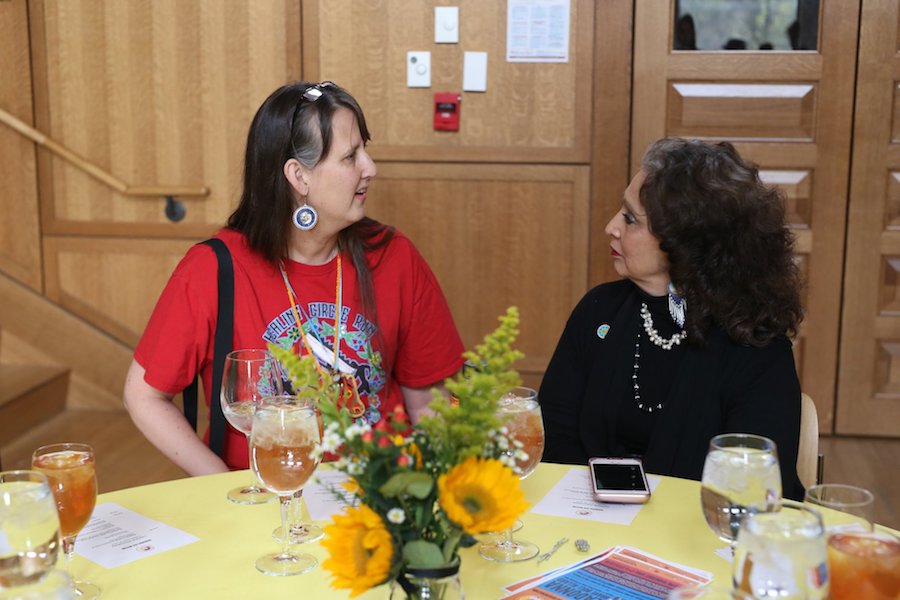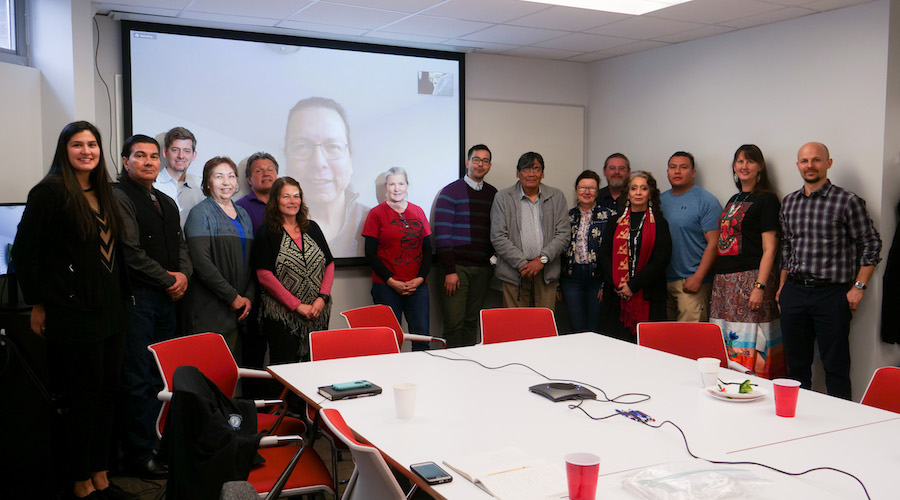Empowering Native Voices
LaDonna Brave Bull Allard, founder of the first resistance camp at Standing Rock, joins Native American and First Nations language teachers for a two-day conference at Penn focused on the revitalization of Indigenous languages and culture.
Last month, the Penn community welcomed a group of research partners from Native American and First Nations tribal communities for two days of meetings, workshops, and a lecture presented by the Penn Language Center’s Educational Partnerships with Indigenous Communities, or EPIC.
Indigenous languages are central to Native cultures, but historically, Native people were forced by the U.S. and Canadian governments to stop speaking them. As a result, many tribes are now engaged in language recovery and rejuvenation. EPIC’s mission is to assist in this effort by sharing knowledge with Native nations while expanding the number of Indigenous languages offered for instruction at Penn. Established through a grant from the National Endowment for the Humanities, the EPIC initiative was founded by the late Timothy Powell, Senior Lecturer in Religious Studies.
Christina Frei, who succeeded Powell as director of EPIC, hopes to continue empowering Native voices through productive relationships. EPIC currently works with members of the Cherokee Nation of Oklahoma, the Eastern Band of Cherokee Indians in North Carolina, the Tuscarora Nation in New York, the M'Chigeeng First Nation (Ojibwe) on Manitoulin Island in Ontario, the Fond du Lac Band (Chippewa) in Wisconsin, the Six Nations Haudenosaunee in Ontario, and the Standing Rock Sioux Tribe in North Dakota.
“The April meetings marked the first opportunity for all of our tribal partners to come together,” says Frei, Executive Director of Language Instruction for Penn Arts & Sciences and Chair of the Penn Language Center. “It kicked things into motion, and we are now following up with a white paper for the NEH in which we will articulate our action plan for moving forward.”
The two-day program culminated with a talk by guest speaker LaDonna Brave Bull Allard titled, “Indigenous Knowledge Systems: Revitalization, Resistance, and Regeneration.” A member of the Standing Rock Sioux Tribe and a tribal historian, Brave Bull Allard founded the first resistance camp to the Dakota Access Pipeline on her family’s land along the Cannonball River in April 2016. Native people from multiple tribal communities joined her to block construction of the pipeline, which threatens the community’s water supply and has damaged or destroyed important ceremonial and burial sites.
The protest, known as NoDAPL, lasted several months and attracted international media attention. As one of largest gatherings of Native North Americans in more than 100 years, it drew Indigenous people from all over the world in a show of solidarity.
Prior to Brave Bull Allard’s talk, the nearly 100 attendees heard opening remarks from Curtis Zunigha, Director of Cultural Resources for the Delaware Tribe of Indians and founder of the Lenape Center in New York City, who spoke about the history of the Lenape people. (Delaware is the English name for the Lenape). Now based in Oklahoma, the Lenape originally occupied lands spanning from the Catskill Mountains in New York through eastern Pennsylvania, all of New Jersey, and into northern Delaware.
Zunigha’s presence was especially significant, says Assistant Professor of Anthropology Margaret Bruchac, since the University sits on Lenape land.
“It’s crucial for educational institutions like Penn to not only acknowledge who these people are, whose territory this is, and what the history is, but to also find ways to bring them into the contemporary conversation,” says Bruchac, who coordinates Penn’s Native American and Indigenous Studies Initiative and is a consultant to the American Section at the Penn Museum and the American Philosophical Society (APS).
One key component to the initiative is “digital repatriation,” which refers to the scanning and digitizing of materials such as recordings and transcriptions of language so they can be shared with tribal communities, something that Powell was deeply involved in through his work with APS.
“The APS has a comprehensive archive of Indigenous language collections,” Frei says. “For many of our partners, particularly the Cherokee and the Eastern Band of the Cherokee, there are not that many fluent speakers of the languages left.”
The Penn Museum, too, is a vital resource for Indigenous people and an essential partner for EPIC, says Stephanie Mach, a doctoral student in museum anthropology, member of the Navajo Nation, and a staff member in the Museum’s Academic Engagement department. “The project is essentially about ensuring access to Native people’s own heritage,” she says. “The overall goal is cultural revitalization, knowledge recovery, and regeneration, and the materials stewarded by the Museum are an integral part of that process.”
Frei and Bruchac envision the EPIC conference as a foundation for long-term, reciprocal relationships between Penn and multiple tribal communities.
“The University could facilitate access to materials at APS and objects in the Penn Museum, and resources in the Language Center or other departments, so that it can be a real back-and-forth,” Bruchac says. For example, she envisions an interdisciplinary course encompassing history, anthropology, folklore, and education that engages Native language experts.
“Through these encounters, we could find ways to create residencies for Native scholars who might want to do research here at Penn,” she says. “Picture inviting an elder who runs language recovery in his or her community to come here for a week or two, do research at APS and the Museum, teach and meet with faculty and students, and then go back to their communities renewed with information they can use for their own educational, cultural, or linguistic purposes.”
Frei notes that the Penn Language Center has the flexibility to hire language instructors to teach Native American languages, but there must be a demonstrated interest on the part of at least five students before an appointment can be made. Currently Penn offers instruction in Quechua, an Indigenous language of Peru and South America, but the University has never taught a North American Indigenous language. “Hopefully, we will be able to secure interest from students to offer Native languages—Lenape would make sense as a starting point,” says Frei.
Stephanie Mach attended a dinner with tribal partners at the Museum and was energized by the sheer amount of information being recovered from museum collections and archives. “It was amazing to hear stories about the power and importance that this information has for Indigenous communities—to have some of these materials come back home, even as a digital copy—is really transformative. And I appreciate knowing that Penn supports Indigenous communities in this way.”
The elements of recovery and reciprocity were of paramount importance for EPIC founder Timothy Powell. In a 2016 article for Museum Anthropology Review, he recalled learning about “community-based scholarship” from one of the EPIC partners, Richard Hill, who was then Director of the Deyohahá:ge: Indigenous Knowledge Centre at Six Nations Polytechnic Institute in Ontario. Powell wrote: “The success of community-based scholarship depends on reimagining the relationship between the academic knowledge systems and the knowledge systems maintained by traditional knowledge keepers and community members who are working to pass the teachings on to the next generation. The goal is to foster a new, sustainable relationship whereby educators in both systems respect the validity of each other’s knowledge in order to craft mutually beneficial partnerships to improve the quality of education in both systems.”
“I think what I'm most proud of, as far as continuing Tim Powell's legacy, is starting a process of healing,” Frei says, “and to approach this partnership based on what our tribal partners need. To ask how the University of Pennsylvania can facilitate their needs, as well as recognize the knowledge they have to share about critical issues such as climate change. Tim understood that our research institutions and scholars have to listen first.”
LaDonna Brave Bull Allard opened her talk with questions for the audience: “Can you see me? Am I invisible?” Her point was to drive home the fact that Native people are still here.
"We want to help ensure that the public becomes more aware of the survivance and visibility of multiple and richly diverse Native Nations,” says Bruchac, “each with their own distinctive history and deserving of understanding on their own terms.”
The conference on April 16 and 17 was co-sponsored by the Penn Language Center and Educational Partnerships with Indigenous Communities (EPIC), with support from the Native American and Indigenous Studies Initiative at Penn, the University of Pennsylvania Museum of Archaeology and Anthropology, the Department of History of Art, Natives at Penn, the Wolf Humanities Center, and the Penn Program in Environmental Humanities.
Students interested in studying Native American languages are encouraged to contact the Penn Language Center.







